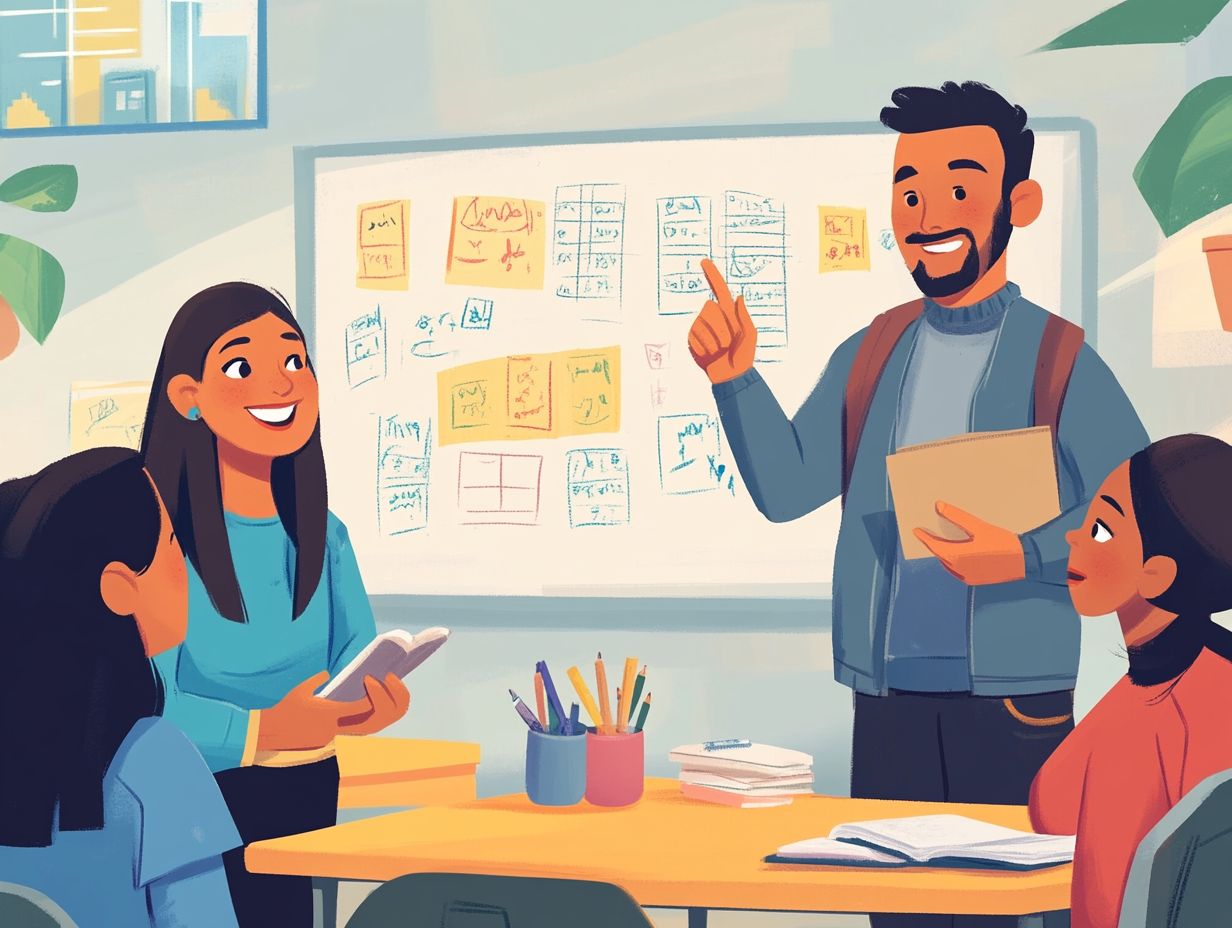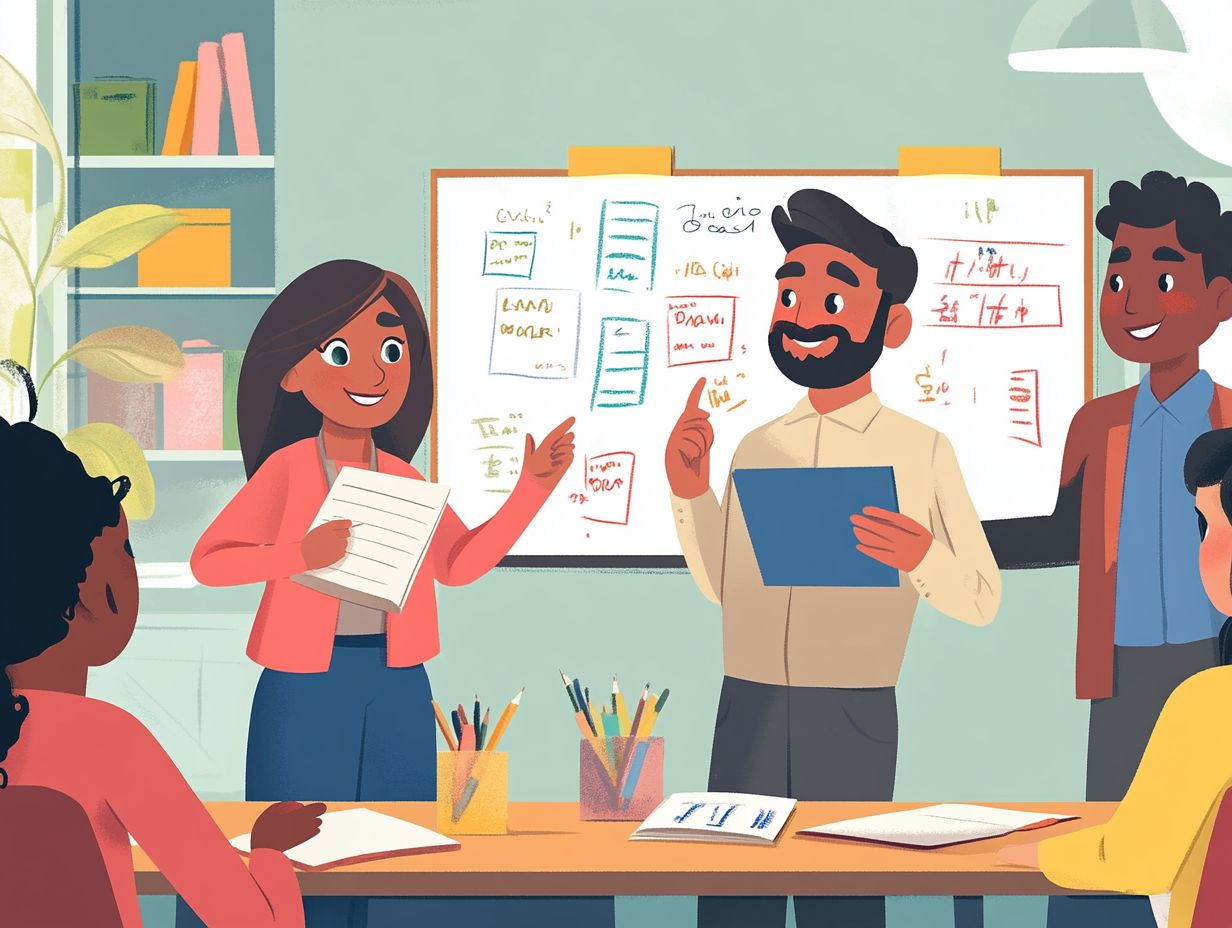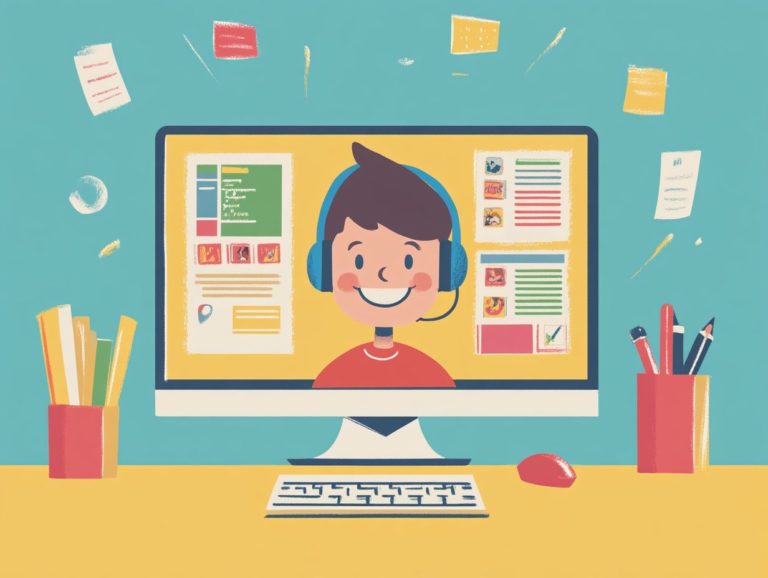The Role of Feedback in Language Learning
Feedback serves as a vital compass in your journey to mastering a new language, illuminating the intricate pathways of communication.
In this journey, you’ll delve into the essence of feedback within the realm of language acquisition, uncovering its diverse forms and profound significance.
You ll discover effective strategies for not only giving but also receiving feedback, along with ways to harness it for ongoing improvement.
Embrace the opportunity to elevate your language learning experience through the power of constructive feedback.
Contents
- Key Takeaways:
- Understanding Feedback in Language Learning
- The Importance of Feedback in Language Learning
- Effective Strategies for Giving and Receiving Feedback
- Using Feedback to Improve Language Learning
- Frequently Asked Questions
- What is the role of feedback in language learning?
- How does feedback aid in language learning?
- What are the types of feedback in language learning?
- How can teachers provide effective feedback in language learning?
- Why is self-assessment an important part of the feedback process in language learning?
- How can learners use feedback to improve their language skills?
Key Takeaways:

- Feedback is an essential component of language learning, providing valuable information on progress and areas for improvement.
- Effective feedback can significantly impact language acquisition, leading to increased motivation and confidence in learners.
- To make the most out of feedback, learners should actively seek and utilize it, while also providing constructive feedback to others.
Understanding Feedback in Language Learning
Understanding feedback in language learning is essential for you as an educator or student, as it significantly shapes the learning experience and boosts student engagement.
Feedback acts as a vital link between teaching methods and your performance. It plays a key role in enhancing your language skills, whether it s listening, speaking, reading, or writing.
By implementing effective feedback mechanisms, you can receive targeted and timely insights that foster your autonomy and motivation, guiding you in self-assessment and error correction.
What is Feedback?
Feedback is crucial in the educational process, especially in language learning, as it provides you with valuable insights into your performance and highlights areas for improvement.
It acts as both a mirror reflecting your strengths and a spotlight illuminating specific skills you can refine for further growth.
Positive feedback boosts your confidence, reinforcing what you excel at, while constructive feedback guides you through challenges, helping you navigate the learning landscape.
Together, these types of feedback create a rich learning environment that encourages autonomy, driving you toward self-directed improvement in your language abilities.
Think about how tools like online quizzes and language learning apps give you instant feedback. They help you track your progress and understand your mistakes right away, fostering a more engaged and motivated approach to mastering new languages.
Types of Feedback in Language Learning
In language learning, you ll encounter various types of feedback that play distinct roles in enhancing your journey.
For instance, formative feedback is typically offered throughout the learning process, helping you pinpoint your strengths and areas that could use some polish.
This kind of feedback not only guides you in refining your strategies but also nurtures your autonomy by encouraging self-reflection.
On the flip side, summative feedback often comes into play at the end of a unit or course, giving you a clear evaluation of your overall achievement and progress.
Specific feedback dives into particular aspects of your performance, enabling you to focus on targeted growth.
Meanwhile, engaging in peer assessment fosters collaboration, allowing you to both give and receive insights from your classmates thus enriching your own understanding.
By integrating these various types of feedback into your language learning experience, whether through interactive group tasks or individual assessments, you can cultivate a more comprehensive skill set and take full ownership of your learning journey.
The Importance of Feedback in Language Learning
Feedback is your secret weapon on the path to mastering a new language!
It profoundly influences your language acquisition, boosts your motivation, and refines your communication skills.
Feedback acts as a reflective tool, helping you grasp your progress while cultivating a supportive learning atmosphere.
In this space, you and your educators can engage in meaningful conversations about performance.
Research by experts such as Hattie and Timperley highlights the critical role of timely and specific feedback in reaching your learning objectives.
How Feedback Affects Language Acquisition

Feedback is key to your language learning journey by establishing feedback loops ongoing cycles of improvement that help you identify errors and make necessary corrections. This ultimately enhances your language skills.
This process is especially important in pronunciation. Immediate guidance allows you to recognize and correct mispronounced sounds before they become entrenched habits.
In terms of grammar, targeted feedback sheds light on the specific rules and structures you need to focus on, fostering a deeper understanding of the language.
Your vocabulary development benefits significantly as well. Timely corrections help you effectively integrate new words into your spoken and written expressions. By receiving constructive feedback promptly, you’re better equipped to navigate your language learning journey and achieve your educational goals.
Benefits of Effective Feedback
Effective feedback offers many exciting benefits! These include heightened student motivation, enhanced progress monitoring, and the nurturing of learner autonomy elements essential for successful language acquisition.
When you provide feedback that is specific, timely, and constructive, you elevate your students’ confidence and inspire them to engage more deeply with the material. This personalized approach fosters a supportive atmosphere, empowering learners to take ownership of their educational journeys.
To make the most of these benefits, try these strategies:
- Regularly scheduled one-on-one check-ins to discuss individual goals,
- Utilizing rubrics, which are scoring guides that outline expectations,
- Incorporating peer reviews that encourage students to learn from one another.
These methods clarify objectives and cultivate a culture of continuous improvement and collaboration, ultimately guiding your students toward greater achievement.
Effective Strategies for Giving and Receiving Feedback
Implementing effective strategies for giving and receiving feedback is crucial for maximizing your educational experience in language learning. This approach fosters open communication between you and your educators, encouraging productive dialogue.
Constructive feedback should be specific, timely, and tailored to help you enhance your language skills while remaining sensitive to your emotional responses. By incorporating strategies like setting clear expectations and promoting self-assessment, educators can cultivate a supportive environment that nurtures your continuous improvement.
Tips for Giving Constructive Feedback
To give effective feedback, focus on clear insights tailored to each learner’s needs and performance. This ensures that your feedback is both relevant and actionable.
By adopting this approach, you foster a supportive learning environment and empower students to take ownership of their growth. Differentiating feedback based on language skills can be particularly vital.
For instance, when addressing writing, you might commend a student s effective use of descriptive language while guiding them to refine their sentence structure for greater clarity.
In speaking tasks, it s equally beneficial to highlight strong pronunciation while gently suggesting ways to enhance fluency. Striking this balance creates a constructive dialogue, allowing learners to feel encouraged as they recognize both their strengths and areas for improvement.
Start applying these strategies today and watch your language skills soar!
Embrace Feedback for Growth!
Receiving feedback positively is crucial for your growth and development in language learning, as it directly influences your motivation levels and fosters your autonomy as a learner.
Embracing helpful feedback can truly transform your approach to your studies. Instead of viewing feedback as a personal attack, you can see it as valuable guidance on your learning journey. By cultivating a mindset that regards suggestions and critiques as stepping stones to improvement, you give yourself the power to refine your skills and deepen your understanding.
This shift in perspective significantly enhances your educational experience, making you more resilient in the face of challenges. You become better equipped to tackle new concepts with an open mind.
Recognizing feedback as a helpful tool can lead to a richer, more engaging learning process for you.
Using Feedback to Improve Language Learning

Incorporating feedback into your language learning journey is crucial for continuous improvement. It allows you to effectively track your progress and adjust your learning strategies based on thoughtful assessments.
This way, you can refine your approach and enhance your overall experience.
Jump into Feedback!
Incorporating feedback mechanisms into your language practice is essential for enhancing your skills, as it provides immediate insights into your performance and highlights areas for improvement.
Utilizing various methods, such as peer reviews, self-assessments, and online tools, can significantly enrich this process. Technology presents innovative instructional tools, like language learning apps and online forums, that facilitate real-time feedback and create an interactive learning environment.
Feedback during learning is particularly crucial here, as it helps you identify specific challenges and strengths without the pressure of formal evaluations. By embracing these approaches, you can cultivate a culture of continuous improvement and give yourself the power to refine your language abilities consistently.
Tracking Progress and Adjusting Based on Feedback
Tracking your progress and adjusting your learning strategies based on feedback is vital for effective performance assessment in language learning. This approach gives you the power to make informed decisions about your learning goals.
Through regular evaluations, you can pinpoint your strengths and identify areas for improvement, allowing you to focus your efforts in a more targeted way. Utilizing formative assessments, like quizzes or reflective journals, gives you immediate insights into your language acquisition. On the other hand, summative assessments help gauge your overall proficiency after completing a unit of instruction.
By incorporating feedback loops, educators can customize their instruction to meet your individual needs, ensuring you progress at your own pace. This dynamic approach cultivates a sense of ownership over your personal growth and enhances motivation by celebrating those small victories along the way.
Frequently Asked Questions
What is the role of feedback in language learning?
The role of feedback in language learning is to provide learners with information on their performance. This helps them identify and correct errors, improve their skills, and develop a better understanding of the language.
How does feedback aid in language learning?

Feedback provides learners with specific and meaningful information about their language use. It helps them identify their strengths and weaknesses and make targeted improvements. Additionally, it allows for reflection and self-assessment, promoting a deeper understanding of the language.
What are the types of feedback in language learning?
The types of feedback in language learning include corrective feedback, positive feedback, and metalinguistic feedback. Corrective feedback focuses on correcting errors, positive feedback reinforces correct language use, and metalinguistic feedback helps learners develop their understanding of the language.
Start using feedback today to transform your language skills!
How can teachers provide effective feedback in language learning?
Teachers can deliver effective feedback by making it timely and specific. Feedback should be actionable and tailored to each student’s needs.
Why is self-assessment an important part of the feedback process in language learning?
Self-assessment, which is when learners evaluate their own work, allows them to track their progress and identify areas for improvement. This process encourages reflection and critical thinking, leading to a deeper understanding of the language.
How can learners use feedback to improve their language skills?
Learners should actively engage with feedback and make targeted adjustments in their language use. Don’t hesitate to ask for more clarification or additional insights to enhance your skills!





